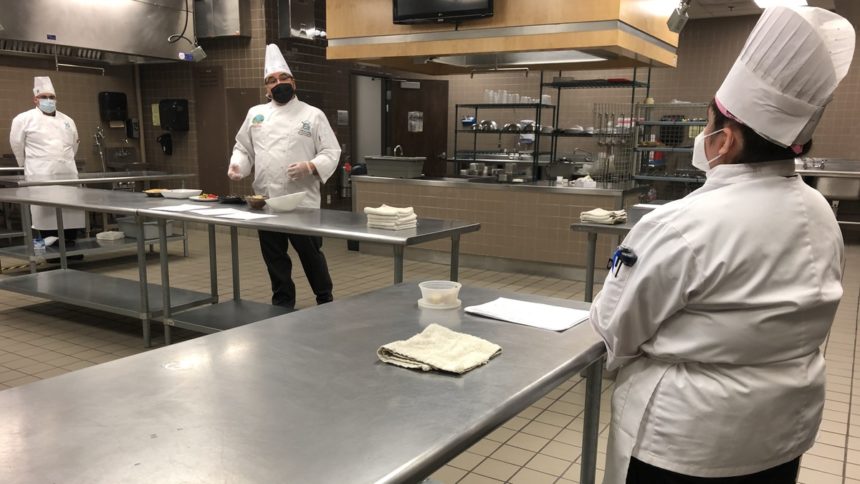Culinary arts students allowed back on El Paso Community College campus

EL PASO, Texas -- As thousands of students in El Paso and southern New Mexico end the school year without returning to the classroom, administrators at El Paso Community College made the calculated decision to bring certain students back to campus, telling ABC-7 both instructors and students deemed it necessary for their futures.
ABC-7 was allowed into the kitchen lab at the EPCC Administrative Services Center on the first day of class May 18. Three culinary arts students wearing masks and gloves and stationed at separate tables watched as their instructor Daniel Guerra assessed their assigned dishes: panzanella, Spanish tortilla and shepherd's pie.
"We want them to come in and actually get their hands dirty in our facility with our equipment," said Guerra, who serves as EPCC's culinary arts program coordinator. "The ovens, the stoves, mixers, pasta rollers, you name it -- they may not have access to that at home."
That's exactly why second-year student Victoria Aguilar said she was glad to be back.
"It's a big part of our major," Aguilar said. "We need to come in (and be) hands-on. It's not just like you can read a book and you'll get it. You need to actually do it yourself to see how it's done."
Reaching this point of bringing students back to class took weeks of planning, said Guerra.
"(It meant) scaling down the classes for just the five students that we're allowing in the class at a time and doing the recipe conversions down from a regular, typical recipe that we'd normally do for 15 students all the way down to just a single portion or two," he explained.
All the faculty instructors came into the kitchen in shifts the week before to prep everything students needed for their lesson.
"We cut down the tomatoes, the cucumbers and the garlic and measured out the oil, so they just could just come in, throw it in the blender and prepare it," Guerra said.
The prep work is normally done by students, Guerra added, but said it was another step to minimize students' time in the kitchen -- going from six to two hours a week -- and to maximize how that time is spent.
Some of the chefs-in-training are also preparing meals for dozens of food-insecure students as part of EPCC's Chefs Share program.
"It's a symbiotic relationship," Guerra said.
Prepping small meals, whether it be for Chefs Share for in their reduced-size classrooms, will be vital for the students once they enter the industry that is adapting to a time of social distancing, he added.
"Our number one job here is to prepare them for industry," Guerra said. "(With) restaurants doing a lot of what we're doing right now -- prepackaging food and then sending it out to guests -- we're definitely doing our best to meet that need."
